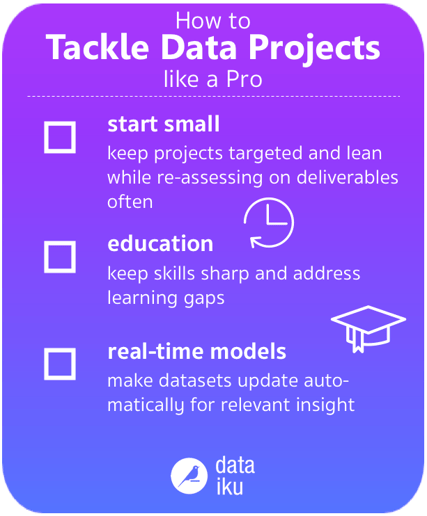Project Managers are experts at adaptation and evolution. They know how to keep their team on track and on budget, while encouraging creative problem-solving. They have contingency plans for their contingency plans. They’re calm, cool, and collected under pressure. But even for Project Managers, the shift toward big data project integration isn’t easy. It necessitates a shift in priorities and strategy, but it is achievable.
We have three essential tips for how project managers can drive data projects to success:
Start (and Stay) Small
This may seem obvious, but it bears repeating. Often, executives pin all their data pipe dreams on a massive early project, even though that’s the opposite of what data needs. One of the key benefits of keeping projects lean and contained is that this creates opportunities to refocus and reassess. Analysts can learn from early steps and you can pivot the overall plan as needed.
Yet even as your data capacities improve, that doesn’t mean scaling up projects. Big data does not mean big projects. Instead of setting a big goal like optimizing targeted marketing, focus on a smaller pilot to try and decrease churn in one sector over the course of a month. Instead of increasing the scope of your projects, keep targeted goals and expand through operationalization, so that everyone in your organization can benefit from your new insights and metrics. Without productionalizing your insights, they will languish in dated presentations, as opposed to producing concrete business value.
Education
Project deadlines will always loom large and impede the ability to learn new skills or refresh old ones, but without this critical steps, teams become unable to adapt or keep up with industry expectations. Forbes found that many businesses hope to rapidly triple the size of their data teams to help make up for internal skill deficiencies.
While a bigger team can increase productivity, the best way to stay competitive is to scale while making time for education. Key skills to master in 2018 include Hadoop, NoSQL, machine and deep learning, and rudimentary data visualization. Existing skills will evolve with training and experience while seeking out opportunities to learn new skills in your industry will enable you to remain competitive and improve team morale.
Real-Time Models
Oftentimes teams spend time and effort to generate insight from their data, only to have their value deprecated by the time it reaches decision-makers. Projects cannot depend on static datasets, but instead must access tables with real-time data that updates automatically.
While this step isn’t always immediately critical for your project’s success, it is critical for the success of your team and prevents you from having to redo the same projects every quarter. Maintaining relevant datasets for your projects ensures that you— and more importantly, other users in your organization—can use your projects to drive their decisions on a daily basis, generating the most return for your investment.
Next Steps
